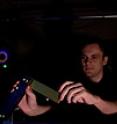Researchers wanted: Humans need not apply?
As science fiction plot lines go, the unintended consequences of yielding tasks too complicated or dangerous for human hands to computers and robots is a popular one. Yet real life scientists are increasingly doing just that, creating automated systems and devices that can not only help collect, organize and analyze scientific data, but that are also able to intelligently and independently draw up new hypotheses and approaches to research based on the data they receive. In a perspectives piece in tomorrow's edition of the journal Science, David Waltz of the Center for Computational Learning Systems at Columbia University and Bruce G. Buchanan of the computer science department at the University of Pittsburgh discuss this brave new world of scientific research and its implications for the way science is conducted. They see this all as a promising trend, but caution that researchers need to consider what tasks are best suited for automation and which should be left to the human mind.
Waltz and Buchanan point out that computer-aided automation has been a part of scientific research for decades, from simple programs that plotted ballistic arcs to databases that held and organized scientific data. All of these systems, however, required a "human in the loop" to shape the research, examine the results and determine how to apply the outcome to future endeavors.
Now the frontiers of automation can now make the human scientist seem obsolete. Waltz and Buchanan write that, "it is possible for one computer program ... to conduct a continuously looping procedure that starts with a question, carries out experiments to answer the question, evaluates the results, and reformulates new questions."
The authors argue that these new systems are arriving just when they are needed the most. As sensors and other instruments get more capable and complex, the scientific world is drowning in data, and having computer-based assistants who can actively sift through the data may be the only way to make sense of it all.
According to Waltz and Buchanan, the prospect of automating science also brings up a number of questions that need to be considered as these new technologies become widely adopted and deployed, e.g., how we determine what to automate, what should be left to human intervention, and how this newly automated research will affect the results and the scientific process. It is also possible, Waltz and Buchanan suggest, that these new tools will generate even more data to be considered, and will therefore contribute to one of the problems they are meant to solve.
Moving forward, the authors suggest that the best approach is to think of these tools as intelligent assistants that can do different types of tasks associated with scientific research. Scientists can then determine which assistants are the best choice for different aspects of their research.
So, does employing these automated assistants mean that students studying science should consider another major? The authors say no, indicating that for all of their capabilities, automated science systems will not do to researchers what robots have done to autoworkers--but they will change how scientists do their jobs.
Said Walter, "Regardless of specialty--biology, physics, chemistry, etc.--scientists may need to add knowledge and skills in artificial intelligence, machine learning, and knowledge representation."
